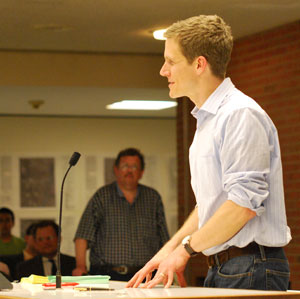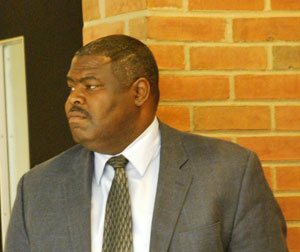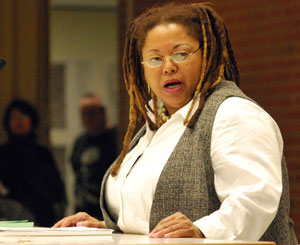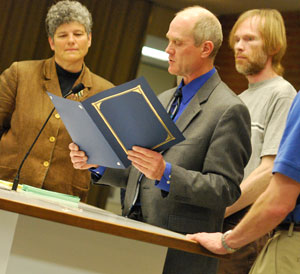Indefinite Busy Signal for Cell Phone Ban
Ann Arbor City Council meeting (April 5, 2010) Part 2: The greatest part of the council’s meeting last week – covered in Part 1 of our report – was taken up with the public hearing and deliberations on The Moravian project, which failed to get the 8-vote super majority it needed for approval. However, the council handled other business besides The Moravian.

Kirk Westphal addressed the city council as a private citizen on the issue of the cell phone ordinance – he serves on the city’s planning commission. He encouraged councilmembers to pursue the ordinance. (Photos by the writer.)
Among that business was a proposed local ordinance banning cell phone use while driving or bicycling. The council decided not to repeat a postponement to a particular date for its consideration of the cell phone ban. Instead, the council tabled the ordinance. Tabling means that the ordinance can be brought back for consideration by the council, but by council rule it will die unless it is brought back within six months.
The council’s business included an item that would have reconsidered its recent decision to replace the entire Ann Arbor housing commission board. The motion for reconsideration was voted down, with no support, not even from its two sponsors – Stephen Kunselman (Ward 3) and Mike Anglin (Ward 5). Kunselman cited the late hour as part of the reason for his lack of enthusiasm for pursuing the matter. Two people had spoken during public commentary on the issue, including one of the ousted board members.
Also receiving brief discussion was a possible council rule on email that the council must consider publicly at its next meeting under terms of a recent lawsuit settlement. Two proclamations were also made, one to declare April as Parkinson’s Disease Awareness Month and the other as part of a recent move by the council to honor parks volunteers once a month.
Ban on Cell Phone Use While Driving
It was at its Aug. 6, 2009 meeting that the council first heard about the possibility of a local ordinance to ban cell phone use while driving. At that meeting, Tony Derezinski (Ward 2) announced that he and Stephen Rapundalo (Ward 2) had asked the city attorney to take a look a developing an ordinance. After its first reading before the council, the ordinance underwent revisions that resulted in a repeat of the first reading. It was then postponed at its second reading. A timeline overview of the cell phone ordinance:
- Aug. 6, 2009: Rapundalo and Derezenski indicated they’ve asked the city attorney to develop a local ban on cell phone use while driving.
- Feb. 16, 2010: Cell phone ban approved on first reading.
- March 1, 2010: Revised cell phone ban approved on first reading.
- March 15, 2010: Cell phone ban postponed to April 5 on second reading.
- April 5, 2010: Cell phone ban tabled.
At the start of the council’s Monday meeting, mayor John Hieftje indicated that the cell phone ban was likely to be postponed. It wound up being tabled. The difference between postponement and tabling is that a postponement specifies a date on which the item will come back before the council. Tabling does not specify a date, and items not brought back within six months are considered “demised” by council rule.
Cell Phone Ban: Public Hearing
Five people spoke during the public hearing on the cell phone ban.
Speaking as a private citizen, but likely more recognizable to councilmembers and the public as a member of the city’s planning commission, was Kirk Westphal. He told the council that as he was bicycling over to the meeting, he thought about what example to use to encourage the council to carry on with their efforts to develop the ordinance. He settled on the near-miss he experienced that very evening. He encouraged the council to take the ordinance forward and then tweak it later if necessary. He questioned why there was an exclusion for hands-free use, when studies on the issue showed that hands-free use was equally distracting.
Noting that he did not own a cell phone, Jim Mogensen said his family did and they found it useful when he was in the emergency room last month. He pointed out that there’s rarely any negative feedback to drivers who use their cell phones. The driver who is weaving back and forth, Mogensen said, rarely realizes how badly he’s weaving.
Penney Justina questioned whether the use of cell phones while driving was a public safety issue in light of the small percentage of drivers who actually use cell phones while driving.
Speaking on behalf of the Ann Arbor Area Chamber of Commerce, vice president of government affairs Kyle Mazurek stressed that the issue should be handled at the state level. Visitors to the area, he said, should not be penalized for “unknowing misconduct.”
Also opposed to the ban was Sammy DeMarco, who described it as “overreaching,” saying that it should be handled at the federal or state level and that it was a waste of the council’s time. He noted that he used his phone to tell time – he drove an older vehicle that did not have a a working clock – and that might be confused with using the cell phone to talk. He characterized such a ban as unfair to out-of-towners, and said there is no proof that this kind of ban works to improve public safety.
Cell Phone Ban: Council Deliberations
Council deliberations were brief. Tony Derezinski (Ward 2) noted that there were a number of bills pending at the state level. He said that while he would not usually be in favor of kicking it up to Lansing, there were indications that the state legislature might actually pass something. With respect to some versions of a cell phone ban that been thought to be dead in committee, Derezinski said, “a couple of corpses have winked.”
When Derezinski was asked by mayor John Hieftje to consider tabling the issue, instead of postponing it, Derezinski agreed. However, quipped Derezinski, if you believe you’ll get something quickly out of Lansing, “then I have a bridge for you!” Replied Hieftje, “I know which one.” [The allusion was to the East Stadium bridge which needs replacement, but for which hoped-for state and federal funds have not materialized.]
Outcome: The cell phone ban was unanimously tabled.
Cell Phone Ban: Other Tabled Ordinances
There are at least two other ordinances that have been tabled by the Ann Arbor city council in the last year. One involved a revision to the city code to regulate toy guns.
- Aug. 6, 2009: Toy guns regulation approved on first reading.
- Sept. 8, 2009: Toy guns regulation postponed at second reading.
- Oct. 5, 2009: Toy guns regulation tabled at second reading.
Based on the council rule, the toy gun ordinance revision is now demised.
The second involves an effort spearheaded by Stephen Rapundalo (Ward 2) to place restrictions on use of plastic grocery bags by local retailers:
- July 21, 2008: Plastic bags ordinance postponed at first reading.
- Oct. 6, 2008: Plastic bags ordinance postponed at first reading.
- March 2, 2009: Plastic bags ordinance postponed at first reading.
- June 1, 2009: Plastic bags ordinance postponed at first reading.
- Sept. 21, 2009: Plastic bags ordinance tabled at first reading.
Based on the council rule, the plastic bag ordinance is also now demised. An 18-minute short film with German filmmaker Werner Herzog narrating the part of a plastic bag searching for its maker provides a cinematic introduction to the subject: [link].
Housing Commission Board Replacement
Before the council was a resolution to reconsider an action taken at its March 15, 2010 meeting to replace the housing commission board. The resolution was sponsored by Mike Anglin (Ward 5) and Stephen Kunselman (Ward 3), who had both voted with the prevailing side – as had all councilmembers present. A motion to reconsider an action can only be brought by someone who voted with the prevailing side.
At the March 15 meeting, the city council voted unanimously to replace the five-member housing commission board, which then consisted of Alan Levy (chair), James Jackson, Dwayne Seals, Marta Manildi and Deborah Gibson. The reasons for the move in the council’s resolution included:
- Lack of urgency related to consideration and implementation of the Operational Needs Assessment.
- Failure to address time-sensitive staffing needs including the appointment of a non-interim Executive Director, and failure to prepare for filling vacant positions prior to expiration of Memorandums of Understandings with employee unions regarding the temporary staffing of positions.
- Concerns with the Board of Commissioner’s [sic] compliance with their Bylaws.
- Lack of action taken regarding continuing financial challenges of the Commission, as well as addressing the finances of subsidiary nonprofits.
- Lack of board engagement and proactivity.
By way of some background not presented at the March 15 meeting, the housing commission board was engaged in a search process to fill the position of the permanent executive directorship. At their Feb. 18, 2010 meeting, the board reached a consensus to conduct reference checks for the two finalists for the job of permanent executive director – which included interim executive director Marge Novak, who had been on the job since the summer of 2009.
The board seemed to be on a path to vote at their next meeting on a decision to select one or the other candidate based on reference checks. However, at the council’s March 15 meeting, city administrator Roger Fraser characterized the board as unable to make a decision on the hire. Asked at that meeting by Mike Anglin (Ward 5) about the hire, Tony Derezinski (Ward 2) – the council’s liaison to the housing commission – said that the expectation was that the interim executive director would be hired.
Alan Levy, chair of the housing commission board, was not told in advance of the council’s action that he was being dismissed from the board. His five-year term was within a month and a half of completion.

Dwayne Seals, former Ann Arbor housing commission board member, at the April 5 city council meeting. Seals did not address the council.
Although the five-member board was completely replaced, two of its members were re-installed: Marta Manildi and Deborah Gibson. Manildi, who’d served for less than a year, was described as not having had a chance to learn the business of the housing board yet, hence her appointment to the newly-constituted board. Gibson was the resident member of the board – by state statute one member of the housing commission board must be a resident of the housing units administered by the commission.
Gibson was appointed for just a one-month term to the newly-constituted board to satisfy the legal requirement of a resident board member. Fraser indicated at the March 15 city council meeting that the resident population would be canvassed for a replacement.
However, before her 1-month appointment was up, Gibson resigned her position in a meeting with Hieftje on March 26, 2010, following up with a letter of resignation on March 27, 2010.
The net effect of the council’s action on March 15 was to replace Levy, Seals and Jackson. At the March 15 meeting, only two of those positions were filled – with Jayne Miller, former community services area administrator for the city, and Mark McDonald, who heads a property management firm.
At last Monday’s city council meeting on April 5, the third slot was filled – with Ron Woods, a professor in Eastern Michigan University’s African American Studies Department.
Replacement of Housing Commission Board: Public Commentary
Three people spoke during public commentary reserved time at the start of the council meeting on the issue of the housing commission board replacement.
Joan Doughty, director of the Community Action Network (CAN), gave her emphatic support to the council’s action to replace the board. She reported that she’d been attending the board’s meetings for 18 months to two years, when she became aware of some serious concerns. She said that the operational needs assessment done by a consultant was “spot on” and she fully endorsed the council’s action. She allowed that the manner in which it was done may have “bruised some egos” but that the board needed people who were not just well-meaning.
Doughty said there was nothing to gain to have a public airing of the issue, saying that it would be “ugly and embarrassing.” She summed up the council’s move to replace the board as a “bold but much needed action.”
Asking the council to think about public housing from the perspective of other public efforts – like public transit and public education – was Jim Mogensen. For public transportation, said Mogensen, the contrast between the interests of low-income people versus middle-income people was seen in the difference between transit-dependent riders versus riders of choice. For public housing, said Mogensen, it was an effort centered on low-income people. What happens, he continued, is that the low-income interests are never completely eliminated from the budget. Instead, he cautioned, the programs are cut back so that they’re ineffective: “You just make it so it becomes dysfunctional.” It’s the budgetary aspect that concerned him most, Mogensen concluded.

Deborah Gibson, formerly of the Ann Arbor housing commission board, speaking during public commentary at the city council’s April 5 meeting.
One of the housing commission board members affected by the wholesale replacement, Deborah Gibson, also addressed the council. She told the council she’d served on the housing commission for eight years. She cautioned council members that they had not heard the voices of public housing and Section 8 residents.
Gibson pointed out that the council’s resolution did not recognize residents and staff as stakeholders. Residents of public housing, she said, should be treated with dignity and respect. The consultant’s report had been relied on too heavily, she said.
Replacement of Housing Commission Board: Council Deliberations
Council deliberations were brief. They came well after midnight – after the public hearing on The Moravian, which had lasted three and a half hours. Stephen Kunselman (Ward 3) began by indicating that he was not asking people to change their vote on the previous action but that he was concerned that the members of the board be treated with some dignity.
Mayor John Hieftje noted that the motion before the council was to reconsider the vote, asking Kunselman if he was now not asking for the reconsideration. Kunselman cited the late hour in saying that he was content to see the motion voted down.
Outcome: The motion to reconsider the decision to replace the housing commission board was unanimously defeated.
Email Rule Discussion
Towards the end of the meeting, mayor John Hieftje and city attorney Stephen Postema engaged in a dialogue about the council rule that councilmembers must discuss at their next meeting as part of the city’s settlement of a recent lawsuit. [Chronicle coverage: "City Settles Lawsuit, Must Conduct Study"]
The rule would require councilmembers to use their government accounts when writing communications on city business. Currently councilmembers do not always do so. When the communications are from one non-government account to another non-government account, The Chronicle’s experience has been that the city does not produce those communications when they meet the description of documents requested under the Freedom of Information Act. In a statement to other media outlets, Postema has maintained that he is not aware that councilmembers do not use their government accounts for city business.
Hieftje and Postema were keen to stress that the settlement did not require the council to adopt such a rule. The settlement does, however, require the council to discuss the issue publicly.
Public Comment
Members of the public addressed the council on a number of other issues.
Public Comment: Fuller Road Station
James D’Amour addressed the issue of funding for the Fuller Road Station, a joint UM-city project including a parking deck plus a bus stop. He has previously addressed the council opposing the station on behalf of the Sierra Club’s Huron Valley Group. D’Amour noted that the cost of the station was $46 million, with 22% of that amount to be paid by the city.
D’Amour said that city administrator Roger Fraser had assured the public that the money to pay for the city’s share of the project would not come from the general fund. But D’Amour asked where it would come from. He also addressed the issue of the land where the parking deck would be built – it’s designated as parkland. Given that the city’s transportation program manager, Eli Cooper, had described the structure as planned to stand for 75 years, D’Amour characterized the project as a de facto taking of public land. Because SEMCOG has delayed indefinitely the east-west Detroit-Ann Arbor commuter rail project, the Fuller Road Station would for now just be a parking deck for the University of Michigan, he said.
Also addressing the council on the same issue of where the city’s share of funding for Fuller Road Station would come from was Nancy Shiffler. Like D’Amour, she said she was concerned about the use of parkland. She adduced a phrase from a statement that Carsten Honnke (Ward 5) had publicized regarding The Moravian that had described a “social compact.” Shiffler said the same kind of social compact applied to the use of parkland.
The social compact on the use of parkland is related to the charter amendment approved by voters in 2008 that requires a voter referendum on the sale of parkland. [The Fuller Road Station does not contemplate a sale, but rather a long-term lease, with the construction of a permanent structure on the land.] Rita Mitchell told the council that she was one of 42,000 voters who had voted for the charter amendment. [The amendment passed with 81% support.] She said that using the lease agreement circumvents the sale. A parking lot – the parcel’s current use – can be returned to use as parkland, but that’s not the case for a parking structure, she said. She noted that there is no regional or federal funding source for the east-west commuter transit for which the station is envisioned.
Public Comment: Porch Couches
Addressing the council as president of the South University Neighborhood Association was Bob Snyder, who spoke in support of a ban on indoor furniture used on outdoor porches. He noted the recent death of a student who lived on South State Street, who died as the result of a fire that may have been related to a porch couch. Snyder remind the council that they had discussed the issue six years ago in 2004, but had not enacted an ordinance. If they had done so, he said, the student who died would still be alive today. Michael Benson, with the Michigan Student Assembly at UM and representative to the council’s student relations committee, suggested that it was time for the the council look at the porch couch ordinance again. He also suggested that the student relations committee meet, as it had not met in over a year.
Public Comment: King Elementary School Crosswalk
Kathy Griswold gave an update on her efforts, which she’s chronicled since fall 2009 at city council meetings to get the mid-block crosswalk in front of King Elementary School moved to an intersection.
Proclamations

Kathleen Russell, left, Parkinson’s Action Network Congressional coordinator, listens as mayor John Hieftje reads aloud the proclamation of April as Parkinson’s Awareness Month.
Two mayoral proclamations were made at Monday’s meeting. One declared April as Parkinson’s Disease Awareness Month. Parkinson’s Disease affects the the central nervous system and often impairs a person’s motor skills and speech, and causes tremors.
In preparation for the hearing on The Moravian, a number of posters and other visual aids had been stowed near the speakers podium. And when the contingent to receive the formal proclamation came forward, some of the material was jostled. Quipped Kathleen Russell, who has been diagnosed with young-onset Parkinson’s, “We shakers and movers know how to make things happen!”
The other proclamation honored the Parker family for their volunteer efforts in Esch Park. The council has made it routine practice to honor its park volunteers at one of its two monthly meetings.
Present: Stephen Rapundalo, Mike Anglin, Margie Teall, Sabra Briere, Sandi Smith, Tony Derezinski, Stephen Kunselman, Marcia Higgins, John Hieftje, Christopher Taylor
Absent: Carsten Hohnke
Next council meeting: April 19, 2010 at 7 p.m. in council chambers, 2nd floor of the Guy C. Larcom, Jr. Municipal Building, 100 N. Fifth Ave. [confirm date]




“In a statement to other media outlets, Postema has maintained that he is not aware that councilmembers do not use their government accounts for city business.”
For an example of the use of personal email accounts for communication between council members that addresses Council business, see the email posted to A2Docs.org from Council member Teall to 8 then-members and others. She discusses a proposed council resolution related to the Argo Dam and she addresses the council members’ personal and business email accounts. [link]
That email was originally linked in an AnnArbor.com article about the underground parking lot litigation.